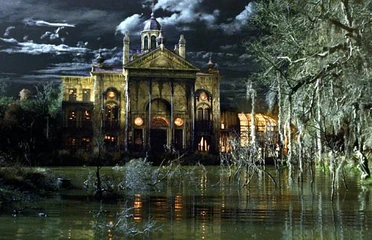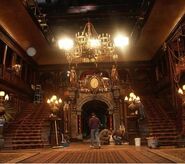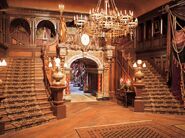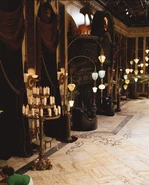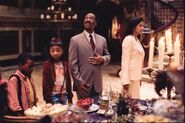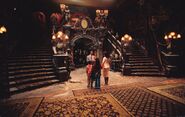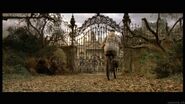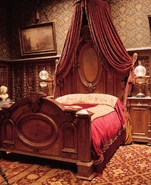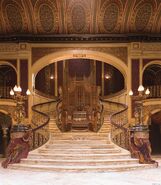"This is the ancestral mansion of the Gracey family. It's a real fixer-upper, with a Victorian ballroom; secret passageways; spacious grounds with room for the whole family; and a mystery that has cursed the house for over 100 years."
—2003 film trailer narration
Gracey Manor is the name of the mansion in the 2003 film. It is heavily based on both the Disneyland and WDW versions of the attraction.
History[]
For an in-depth history of the house, see The Legend of Gracey Manor.[]
Gracey Manor was a mansion once home to the Gracey family, located in or around New Orleans, Louisiana. It was built by a wealthy sea captain named Ambrose Gracey. The mansion became cursed, and was haunted by the spirits of Edward Gracey, his lover Elizabeth Henshaw, the house servants, and others.
Beginnings[]
The mansion was built by Captain Ambrose Gracey, the young captain of a merchant clipper ship based in the busy port of New Orleans, after he purchased land and property overlooking the river on the outskirts of the city in the 1800s. Although his profits to build the house came from all his shippings of chandeliers, rugs, European furnishings, wines, lamps, and all manner of luxury goods from Europe and the East Coast cities to the citizens of the sophisticated city of New Orleans., two critical factors became the reasons of his amassed fortune; his ships were free from pirate attacks, allowing him to keep a generous percentage of the value of all goods transported on his ships, and his secret association with pirate Jean Laffite, which made him able to return to the docks of New Orleans with more goods than he started with.
The mansion was designed with many windows and a porch that provided views far across the river and was properly aligned so he could easily send and receive lantern signals from the front rooms of his home. The home had access by land and water, which eased his trading activities. Behind the property was once a small local cemetery, with some of its graves remaining. Many find it strange to build a home so close to a cemetery. But this was on Ambrose' choice to build his home near it, as he has good commanding views and saw the advantages of the raised elevation, which would protect the house from flooding.
In order to obscure the cemetery view from the bedroom windows, Ambrose planted an oak tree behind the house. At the same time, he considered the proximity of the cemetery to be quite advantageous, since he could build a secret tunnel linking a burial crypt to the house that no one would easily discover. The cemetery would later be integrated as part of the house' backyard.
Ambrose's well-guarded relationships with both pirates and politicians enabled him to design the mansion with secret passages, which would be beneficial in bringing in and storing illicit loot. The passages secretly linked not only portions of the house, but also the cemetery and the river, and even provided safer means of concealment or escape if attacked by pirates, thieves or (in the case of the war of 1812) the British army. They also allowed Gracey to discreetly eavesdrop and glean valuable information that he could later use to his own advantage.
He also ensured that the mansion included ample, comfortable guest rooms for visiting politicians, businessmen, and foreign dignitaries, as well as his relatives. The final straw of construction was the addition of a golden sailing ship weather vane on top of the cupola of the house as a marker for visitors.
While in London, Ambrose met a charming young Frenchwoman, Juliet Desmoulins, whose family had been forced to flee Paris during the French Revolution. After their marriage in England, they returned to New Orleans where Juliet had "star" quality that appealed to the local aristocracy, who prefer the French to the ill-mannered Americans. Juliet bore him children, which prompted Ambrose to expand their home and start a shipping company. One of these children was George Gracey, who became the apple of his father's eye. George was quick-witted, fearless, and intelligent. George spent many hours with his father, learning many things from him. He fell in love with Gracey Manor and its elements.
The Golden Age of Gracey Manor[]
George was privately schooled, which fueled his public ambitions. He became obsessed with becoming richer, more successful, and more respected than any other family of old New Orleans after his father sent him to England for his college courses.
Just before leaving England to return to America, George stayed at a summer estate with friends, where he met a well-cultured, loyal young butler named Ramsley, whose employers view as part of their family. One day, he noticed Ramsley wrongly blamed for an an unspeakable offense at his current employer's house - a transgression actually committed by the employer's son. With threats of a beating and a possible jail term for the offense bringing burden to Ramsley, George offered him a position of being a butler at Gracey Manor in America. An amazed and grateful Ramsley accepted the offer and George paid his passage for the trip. In the following years, Ramsley proved an invaluable asset to George in achieving the social goals he set for himself and his family.
George took an active role in the family business, which was based in New Orleans, and proved an able entrepreneur. Following his father's unexpected death in a carriage accident, George bought steamboats and expanded the shipping company, making it one of the largest in the south. Later on, Ramsley helped arrange a meeting with Abigail, the beautiful and vivacious daughter of a state senator, once a former ambassador to England.
After their marriage, George expanded the manor, adding a grand ballroom, portrait galleries and a conservatory. He and Abigail traveled to Europe, where they collected furnishings and art for their expanded home. Among these were a unique cast iron fireplace, a statuary, and a massive pipe organ under restoration. The items came from a Scottish landowner's estate, which had burned to the ground, leaving only the said items as the surviving furnishings. The locals apparently thought the landowner was evil and his house was cursed, so George was able to acquire the extraordinary fireplace at a very low price. Abigail was known to have passion and interest for music, which made George purchase the pipe organ. By the time George purchased the pipe organ, it survived intact and was undergoing restoration at the landowner's Caretaker's House.
Upon their return to America, George moved their small organ to the attic and placed the impressive Scottish organ in the newly completed grand ballroom. The ballroom would soon be the setting for countless parties, masked balls, and their annual Mardi Gras fêtes. George also brought home a unique collection of antique suits of armor, which he displayed in the house' great hall.
As the years progressed, the couple had a daughter and son, who filled the house with their laughter. A few years later, a third child, Edward Gracey, was born. A parade of animals, pets, and childhood playthings filled the grounds. Invitations to their home became some of the most sought after invitations in Southern and East Coast society.
Tragedy Befalls the Graceys[]
Abigail took the children to visit her relatives in Georgia one summer and did this in part to avoid the yellow fever that frequently struck the region around their home in the summer. While in Georgia, the children came down with scarlet fever. Later on, the two eldest children died, leaving Edward the sole survivor.
Abigail returned home, inconsolable, barely speaking or eating. She cancelled all social visits and sat in dark rooms. In a strange turn of events, she became obsessed with the occult and converted her upstairs sitting room into a séance room and brought in gypsy medium Madame Leota, who used a crystal ball to contact the dead. Abigail later died, aged beyond her years and her spirit broken. Following her funeral, George sealed off the séance room and resumed his work.
A Will for Posterity[]
Concerned for Edward's future, George transferred the bulk of his money to a British bank and modified his will. In his will, he specified that should he pass away, the Estate would take care of all future expenses related to the maintenance of his home, specifying that the home could not be sold without physical possession of the original deed, which George would keep hidden for his son. His generous gift of a new courthouse to the county waived future taxes on Gracey Manor in perpetuity.
With Edward's financial stability ensured, George placed the responsibility for the proper training and upbringing of seven-year-old Edward to private instructors, all overseen by Ramsley. George then re-dedicated himself to doing what he enjoyed best - amassing a fortune. He also told Ramsley of his dreams for Edward's future as a governor, ambassador or even president. To prepare for this, George wanted Edward to get the right education, the right friends, and the right wife. Ramsley pledged to do everything in his power to make sure the boy had the proper training and education to perform his proper role in society.
Although Edward had many friends, his best childhood friends were the children of the servants. Ramsley objected to their association but allowed it on a limited basis since there were no other children from miles around. He even saw saw to the boy's social training and saw that he was accomplished in a range of gentlemanly activities.
At the age of 15, Edward was sent to Boston to continue his education. He returned home during extended vacations, where Ramsley continued his instructions. Upon completing his education at age 24, Edward accepted a post at a Boston law firm. He was known to his colleagues and other people to be intelligent, soft spoken and cultured, with a quick wit and having a romantic nature instead of being aggressive - a source of endless annoyance to his father.
When George Gracey died the following year, Edward Gracey returned to Gracey Manor. He turned the day-to-day operation of the shipping company over to his father's trusted advisors. At Ramsley's insistence, Edward joined the social elite in New Orleans where he met the most well-bred young ladies in the region, who find him to be a desirable bachelor. The annual Mardi Gras balls began again at Gracey Manor, now with Edward as the soft-spoken but convivial host.
Gracey Manor Darkens[]
The Mystery Begins[]
In a twist of events, the parties ceased, the house fell dark, and Edward stopped his social whirl. Although no one knows exactly what happened, it was at this time that rumors about Gracey Manor began to be surface. Residents reported seeing an old gypsy woman at the mansion from time to time, but for the most part, the house was silent. It soon became the subject of gossip and speculation.
Workers in the home claimed that the house had a spirit of its own and could transform itself at will. Some said that daytime would suddenly turn to night and that lightning would strike on a sunny day. Others claimed that brass knobs transformed into bats, wall sconces became gargoyles and family portraits changed into images of the dead. Some even reported seeing ghostly dancers in the ballroom, who appeared and disappeared at will.
For many years, Gracey Manor remained a commanding landmark, an embodiment of the grandeur, romance, legends and mysteries of another time.
These events were actually caused by terrible events in Gracey Manor. On one occasion, Edward fell in love with one of his best friends, Elizabeth Henshaw, who was the mixed-race daughter of one of the mansion's multiracial servants. Edward had done this possibly after seeing oppression against people of color (which included multiracial people), which motivated him to show sympathy and extend the Gracey legacy to them. Edward proposed to Elizabeth, who accepted it with a promise of marriage in a letter.
Ramsley, however, opposed the relationship due to Elizabeth's status, which proved that he himself was a racist. Prior to a party, he confiscated Elizabeth's real letter and penned another letter similar to Elizabeth, which states of rejection. He later poisons a goblet of wine which he serves to Elizabeth.
Once Elizabeth drank the wine, she was poisoned. Edward felt devastated by her death and later hanged himself in the cupola; his death causing a curse to be placed in the entire estate. The inhabitants of the manor died due to the curse, turning them to ghosts.
The Evers invited[]
In one occassion, the inhabitants of Gracey Manor invited Jim and Sara Evers to the mansion in an attempt to sell the house. During their stay, they manage to uncover clues to the mystery, finding out that the inhabitants are ghosts themselves. After locating a key in the cemetery, they manage to find Elizabeth's real letter, which confirms her murder. Ramsley admits his role to the crime and tries to hide the truth by manipulating Edward's ghost that Sara is Elizabeth and the curse would be broken, prompting a marriage between the two.
Returning to light and the Evers' ownership of the estate[]
Jim and his children finally reveal the truth to Edward and the other inhabitants about how the curse happened and how Ramsley lied to him for long. Edward becomes enraged of Ramsley's actions, causing the latter to attempt to kill the entire group but instead was dragged to Hell for punishment.
With the curse broken Edward and Elizabeth, along with the house' inhabitants, move to the afterlife. All that remained for the Evers is a deed left for them by Edward, which made them the new owners of the house.
It is unknown if the Evers sold the house but it is implied that they had made Gracey Manor their new home and new base of operations for their real estate business.
Notable inhabitants[]
The following names are of individuals who were associated with Gracey Manor in some way (most of whom lived there).
- Abigail Gracey
- Ambrose Gracey
- Edward Gracey
- Elizabeth Henshaw
- Emma
- Ezra
- George Gracey
- Jim Evers
- Juliet Desmoulins
- Leota
- Megan Evers
- Michael Evers
- Ramsley
- Sara Evers
Trivia[]
- The design of the film's Gracey Manor is Renaissance-influenced with a mix of antebellum architecture and colonial-revival style.
- It is primarily designed on Disneyland version, as it takes the appearance of a plantation house, albeit on a larger scale, hence its Renaissance influence, and is located in the countryside bayou of New Orleans, Louisiana, one of the southern states of the US. It's location in Louisiana is anod to the Disneyland version being located in New Orleans Square.
- It contains elements of the Walt Disney World version; notably the glass conservatory on the side of the house. Other elements of the WDW version includes the conservatory, library, and music room, which were merged into a giant library for the film.
- Gracey Manor is also the name of the titular mansion in the comics. In The Misery of the Manse Part One (Haunted Mansion #7), Gracey Manor is modeled after the version in the film.
- The film's Gracey Manor was recreated in the video game.
- In the teaser poster for the film, Gracey Manor is depicted as taller and thinner, and the conservatory is absent.
- In the original animated teaser trailer for the film, the voice-over narration (Corey Burton as the Ghost Host) states that Gracey Manor (referred to as "The Gracey Mansion") has 52 bedrooms, 67 bathrooms, and 999 ghosts. The house in the teaser is depicted as a towering Victorian mansion that looks more like Phantom Manor or the WDW Mansion than like the more classical New-Orleans seen in the final movie.
- In early drafts of the screenplay, Gracey Manor was located in upstate New York. Had this aspect been kept, the mansion's design would have likely been modeled after the Walt Disney World version.
